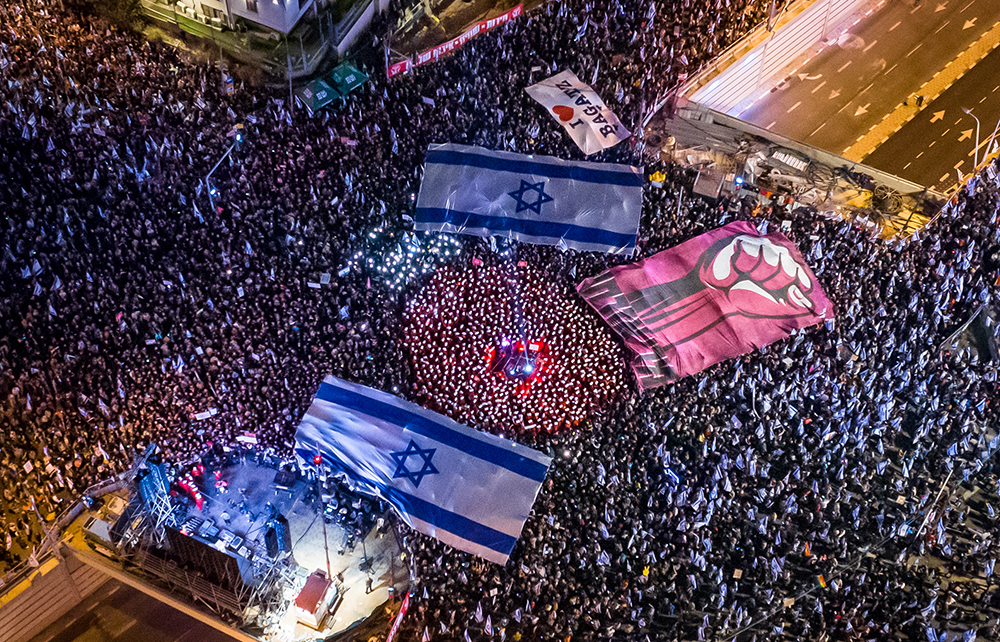Bibi is back. Benjamin Netanyahu has returned to the prime ministership of Israel two years after a motley coalition of his many enemies banded together to topple him. With him removed from power and facing trial on corruption charges, many assumed that the Netanyahu era was over. They under-estimated the wiliest politician in the Middle East. In last November’s elections, Netanyahu ousted his ousters and won for himself a sixth term in which to wreak vengeance on the leftist establishment he believes is ranged against him.
The most powerful man in Israel presents himself as the helpless victim of ‘leftist’ journalists
Victory did not come without a price. He had to team up with the disreputable right. Itamar Ben-Gvir, once convicted for inciting racism and supporting a terrorist organisation, is the national security minister, responsible for the Israeli police; and Bezalel Smotrich, who describes himself as ‘a fascist homophobe’, but has promised he ‘won’t stone gays’, is finance minister. Netanyahu now spends much of his time distancing himself from the allies to whom he has shackled his political fortunes. Bibi is back in office but not in charge.
Bibi: My Story is his account of how he got there. He is an accomplished storyteller, a timely leader for an era of narratives. The central narrative of Bibi’s story, his personal and political bereshit, is the death of his older brother Yoni, a national hero killed in the 1976 hostage rescue mission at Entebbe. Bibi idolised Yoni, his teacher, protector, corrector in childhood and role model coming into adulthood. Without his death, Bibi reflects, ‘my life would have taken a different course’.
The course it took ranged from elite solder, to Israeli ambassador to the UN, to Knesset member, to Likud leader, to prime minister once, twice, and now a third time. He took the Likud from the national liberalism of Menachem Begin to a proto-Trumpism, roiling with sectarian grievance and populist bombast. He has steered Israel to the right – aided vigorously by the country’s inept, self-destructive left – in both economic and security terms.
Security is another crucial Netanyahu narrative. He pays his dues to his parents’ generation for re-establishing Jewish sovereignty in the Land of Israel, but warns that ‘the enduring permanence of this triumph has never been guaranteed. My parents’ generation was tasked with founding the state; my generation was tasked with securing its future.’ Israel faces severe threats on multiple fronts, no doubt about it; but Bibi is the architect of permanent siege Israelism, a mindset in which the Jewish state, now on its sixth peace or normalisation agreement with an Arab or Muslim country, is forever on the brink of being pushed into the sea.
A lack of introspection can ruin good memoirs, but self-pity makes them dull. And, boy, does Bibi whine. His wife Sara receives ‘virtually no attention or accolades in the press for her philanthropic work’. His son Yair has ‘earned… quite a few enemies’ for the ‘combative directness’ of his ‘impassioned political columns and commentary’. (He has compared police officers investigating his father to the Gestapo, and promoted the conspiracy theory that Barack Obama was born in Kenya.) Bibi himself is the victim of ‘a systemic campaign of lies’, and a media that has ‘echoed the attacks of my political opponents’. A perennial Netanyahu narrative: Bibi, the most powerful man in Israel, is the helpless victim of ‘leftist’ journalists.
His account is not without value, especially on US-Israel relations. He claims that Bill Clinton admitted to having tried to throw the 1996 Israeli election for Bibi’s left-leaning rival Shimon Peres. He alleges that Obama tried to intimidate him in the Oval Office. Although not quoting the supposed threat, he calls it ‘something out of character that shocked me deeply’, an ‘offensive message’ that was ‘highly disturbing’. After years of the Obama administration keeping a tight leash on Israel’s response to the Iranian nuclear threat, Netanyahu’s first White House meeting with the 45th president underlined the change from the 44th. ‘Why didn’t you bomb them?’ Donald Trump demanded.
Leadership is a recurring theme, not least Netanyahu’s duty to the past and future of Zionism: ‘Having restored our independence, we cannot, we will not, let anyone bring an end to this miracle.’ His opponents say it is Bibi who is now threatening the miracle. Far-reaching judicial reforms, which critics allege will enervate Israeli democracy, have brought tens of thousands to the streets of Tel Aviv and, more ominously, Jerusalem for weekly demonstrations. Some IDF reservists have stopped showing up for duty in protest. Amid a spate of Palestinian terror attacks, Ben-Gvir has proved a more capable TikToker than security minister. Settlers recently rampaged through a Palestinian village, prompting Smotrich to call for the village to be ‘wiped out’. Israel is inching closer to a very dark future.
This is Bibi’s story. The book is just another narrative.







Comments